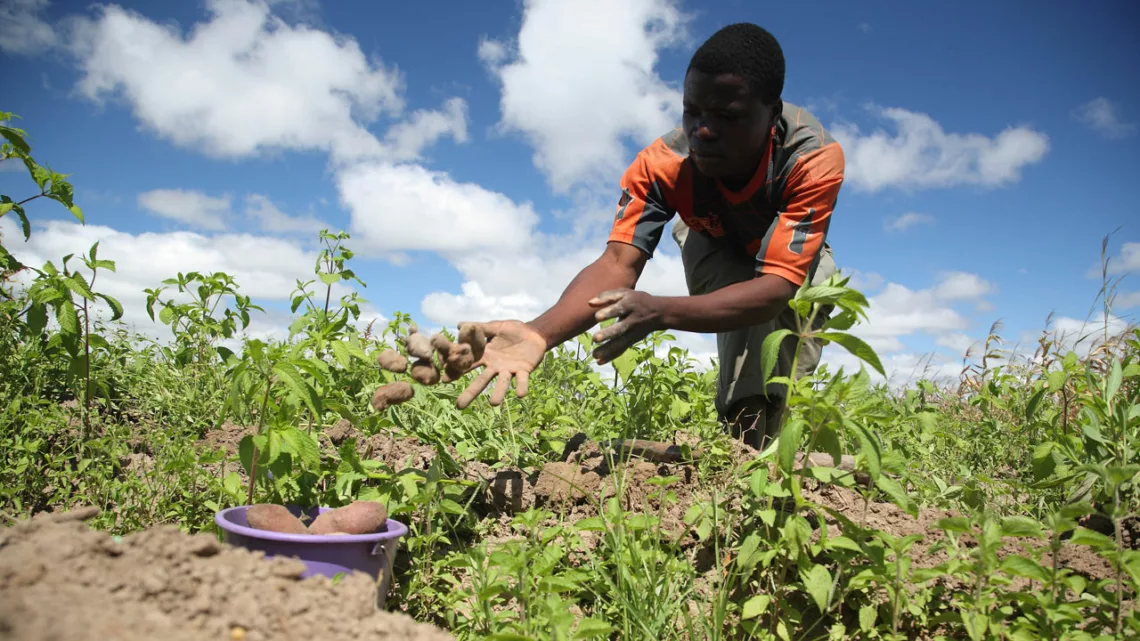Climate change has continue to take its toll on food security globally and challenges such as deforestation even compounds the problems for food production.
As bush burning and lack of afforestation keep depleting soil fertility and erode biodiversity, farmers in Nigeria are not spelt out in the heavy burdens of making their ends meet.
Although food security is a global challenge that affects millions of people, especially in developing countries and creating solutions to the challenges are still far from the expectations of farmers.
According to the Food and Agriculture Organization (FAO), food security exists when all people, at all times, have physical and economic access to sufficient, safe and nutritious food that meets their dietary needs and food preferences for an active and healthy life
Already evidence from various findings show that many factors such as climate change, population growth, land degradation, water scarcity, and conflicts threaten the availability, accessibility, utilisation and stability of food systems.
One of the potential way to fight these challenges without breaking banks is to enhance food security using afforestation. As a paradigm shift, this model which is the establishment of forests on lands that have not been forested for a long time or never been forested before.
Afforestation has proven multiple benefits for food security, such as; increasing soil fertility and water retention by adding organic matter and reducing erosion, providing food products such as fruits, nuts, mushrooms, honey, and edible insects from trees and shrubs.
Enhancing crop productivity and diversity by creating favorable microclimates, pollination services, pest control, and agroforestry systems, improving livelihoods and income generation by creating employment opportunities, market access, and value addition for forest products are some other benefits that farmers can get from the practice.
Afforestation can also help reduce greenhouse gas emissions and enhancing carbon sequestration by increasing forest cover and biomass.
It’s pertinent to note that afforestation also faces some challenges and trade-offs, such as competing with other land uses such as agriculture, urbanisation and mining and facing biophysical and socio-economic risks such as droughts, fires, pests, diseases, land tenure issues, and policy gaps.
Afforestation needs to be planned and implemented in a participatory, adaptive, and integrated manner that considers the local context, needs, and preferences of the stakeholders involved. Moreover, afforestation needs to be supported by enabling policies, institutions, incentives, and technologies that can facilitate its adoption and sustainability.
One of the novel approaches to afforestation that can enhance food security is the use of low-cost solar thermal desalination systems that can produce fresh water from brackish or saline water sources. This can enable the irrigation of crops and trees in arid or semi-arid regions where water scarcity is a major constraint for agriculture and forestry.
According to a research project led by the University of Edinburgh and the Strathmore Energy Research Centre in Kenya has developed and tested such a system that can be locally built and operated.
The system uses solar energy to heat saline water in a basin covered by a transparent plastic sheet. The water evaporates and condenses on the inner surface of the sheet, forming droplets that are collected in a gutter. The fresh water can then be used for irrigation or domestic purposes. The system has been successfully tested in Turkana County in Kenya, where it has been used to grow crops such as maize and beans, as well as tree saplings such as acacia and moringa.
Another innovative approach to afforestation that can enhance food security is the use of vapor-fed irrigation techniques that can prevent soil salinisation. Soil salinisation is a process where salts accumulate in the soil due to irrigation with saline water or natural processes such as evaporation or capillary rise.
Soil salinisation reduces soil quality and crop yield by affecting the physical, chemical, and biological properties of the soil. To avoid this problem, vapor-fed irrigation techniques use vapor or mist instead of liquid water to irrigate crops or trees.
This can reduce the amount of water and salt applied to the soil, as well as increase the efficiency of water use. Some examples of vapor-fed irrigation techniques are fog harvesting, dew harvesting, atmospheric water generators, and solar stills. These techniques have been experimented with in various countries such as Chile, Morocco, India, and Israel, showing promising results for enhancing food security through afforestation.
A professor of Agronomy at the Ahmadu Bello University Zaria, Salihu Adamu Dadari has advanced for a massive afforestation to reclaim the lost vegetation.
Professor Dadari stated that, with the afforestation model, the vegetation will increase carbon capture and enable crops to harness the benefits of ecosystem for maximum productivity and boost food production.
To drive this, professor Dadari added that Nigeria must embark on massive afforestation especially in moderate rainfall areas of the country and the Niger Delta regions due to activities of oil exploration and environmental degradation.
He said, “Nigeria with the population of over 200 million people need to eat, drink and have balanced diet but the challenges facing the agricultural sector are in two dimension, the climate change and insecurity and all of them are operating simultaneously but in our own effort which has to do first, climate change and the effect and despite that fact, we have also contributed to that in the sense that we always leave the ozone eroded through human activities such as exploration of oil, burning of tires, burning of forest and cutting of trees for charcoal. All this have affected atmosphere and created unpredictable rainfall.
“All these problems can only be addressed through planting of trees and managing of the forest as you cannot run a country under hunger, so we expect all Nigerians to put their hands on desk and support government from all ramification to make sure our crops are protected against climate change through afforestation to salvage the situation.”




